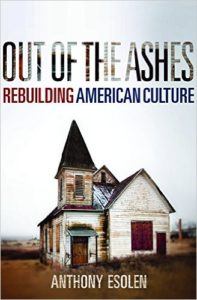 Anthony Esolen teaches Renaissance English Literature and the Development of Western Civilization at Providence College. He’s also the author of Out of the Ashes: Rebuilding American Culture. I just finished listening to it, and then enjoyed it so much I bought a print version. I don’t typically read book-length cultural criticism, but I recommend this one highly. Like all works of the sort, you need to mull it over and pray over what conclusions to take to yourself and run with, but over all, Professor Esolen writes at such a shockingly honest, biblical level about so many pressing matters of our day that you can’t go wrong with having him challenge you on just about every point he brings up. It’s a very refreshing thing to have someone so well-informed say the very things you’ve been thinking all along about a lot of the “big issues.” The book is full of insights like this:
Anthony Esolen teaches Renaissance English Literature and the Development of Western Civilization at Providence College. He’s also the author of Out of the Ashes: Rebuilding American Culture. I just finished listening to it, and then enjoyed it so much I bought a print version. I don’t typically read book-length cultural criticism, but I recommend this one highly. Like all works of the sort, you need to mull it over and pray over what conclusions to take to yourself and run with, but over all, Professor Esolen writes at such a shockingly honest, biblical level about so many pressing matters of our day that you can’t go wrong with having him challenge you on just about every point he brings up. It’s a very refreshing thing to have someone so well-informed say the very things you’ve been thinking all along about a lot of the “big issues.” The book is full of insights like this:
The lie rushes in to fill up the void left by truth in retreat. When people lose their faith in God, for example they do not then believe in nothing. It is as Chesterton said. They commence believing in anything, usually the nearest and biggest thing, the gross power of the state to solve all human problems. Or they begin to worship their own most powerful physical and emotional drives. Or they worship what they wish would be the biggest thing in the world, themselves. Self, sex, and the state, the three most obvious substitutes, or the three together, the three-poisoned god.
Since we’ve lived through the last 10 years or so, that’s hard to argue with, right? But this section, from early in the book, really got my mind going. And I wonder how it hits you:
The point here is that the lie cannot be defeated by a vacuity. It has to be defeated by truth. But since we are embodied souls, the truth we are seeking must not be merely abstract. An ax cannot compete against a Sherman tank, unless the Sherman tank is an abstract tank, an idea of a tank; the ax can smash that sort of tank all the time. Therefore we have to immerse ourselves in things: trees, stars, mud, grouse, hay, stones, brooks, rain, dogs, fire; and the man made things closest to the human hand and its work: hammer, shovel, paintbrush, wrench, wheel…
It is hard to go completely mad if you spend your free time being free and accepting the free bounties of the world round about. Consider the conversation of human beings before the advent of mass media. A boy could grow up and never see anything obscene at all; where would it come from?… Meanwhile, the boy would roam the village or the woods and learn things, learn about things, every day…
I can illustrate with a series of questions. You are on a bench on Cape Cod.
- The wind is coming from the southwest. What does that mean? How can you tell that it is the southwest and not the southeast when you don’t have a compass?
- The tide is in. How can you tell that?
- Tomorrow there will be a full moon. How do you know that? What does that have to do with the tide?
- Where are you likely to find clams? Will it be better in about twelve hours, when the tide is out? How do you know that?
- You want to loaf about the shore in a canoe. The canoe is leaking a little. What can you use to stop up the leak? Where can you find it?
- The man in the house on the point has been catching eels. How do you do that? Where are you likely to find them? What bait do you use? When you catch one…how do you cook it?
- Next week you want to go somewhere that is ten miles away rather than five, so you won’t be able to walk there; you’ll have to take a horse or mule. Whats the difference in how they ride? How do you curry a horse when you bring him in for the night?
- There’s a male horse in the stables named Joey. What did they have to do to him yo make him tame enough for children? When would you do that? How would you keep him from bleeding to death?
- How do you butcher a pig? How do you build a smokehouse for the bacon? What kind of wood do you use for the fire, and why? How thick should you cut the flinches of the bacon? Where would you find the wood?
- How can you tell a maple from an oak? What can you do with quince, angelica root, sassafras, chokecherries, bilberries, hazelnuts, beechnuts, birch bark, willow bark, willow bark, and the resin from pine trees? How do you tap a maple tree for syrup?
- How do you graft sweet apples on a hardier trunk?
- How do you keep a beehive? What does the honeycomb taste like?
- When do you gather cranberries? Are they still good if they are on the ground the next spring?
- What are those birds that descend upon berry bushes in big flocks, nibbling the berries and passing them along to one another? What is the bird they call a yellowhammer? When do the warblers pass through on their way north or south?
- How do you clean trees and stumps from a field?
- How do you handle a mattock?
- What is an ice saw? How do you know if the ice on a pond is thick enough for skating? How do you cut blocks of ice for use in the summer? How do you keep it from melting?
- What do you do with the eye of potatoes if you want to plant them?
- How do you make sourdough bread?
- Is that mushroom growing out of the side of a tree, looking like breakfast, good to eat?
- What is that bright red star in the night sky that does not keep the same place among the constellations? If you wanted to find Jupiter in the sky, where would you generally look?
- Why, on Cape Cod, is the sun never directly over your head?
- What makes the days so short in winter?
- If you want to make bricks, where would you be likely to find a good clay pit?
- What kind of stone is marble? What is soapstone, feldspar, mica, obsidian, jasper?
I have asked my freshman honors students at college where in the sky the sun will be, in the middle of the afternoon in September, here in Rhode Island. They don’t know. They are strangers to the world, but they certainly are not strangers to the lies and folly that are the stock in trade, as I have said, of mass entertainment, mass education, and mass politics.
Things, in their beautiful and imposing integrity, do not easily bend to lies. A bull and not a cow. Grass is food for cattle but not for man. A warble is alive but a rock is not. The three-hundred-pound stone will not move for a little child or a boy or a feminist professor. Water expands when it freezes and will break anything unless you allow for that. Things are what hey are. They know no slogans, and they don’t lie.
And they give witness to the glory of God.
He’s really piling on there. It’s good for all of us to read. But for the purposes of this post, one thing seems pressing. One of the foundational lies of our time, one of the lies that drags people away from following Christ, is that we, as a society, and as individuals, are just simply more advanced than people were in the past. We’re smarter and wiser than our parents. If you ask people why, they will almost certainly point to our technology. If you ask a young person why, he or she might just hold up their smart phone. There you go–here’s our superiority, connected to WiFi, and right in the palm of my hand.
But that list of questions from Professor Esolen exposes that whole way of thinking for the total fraud that it is. How many of us could survive without the electricity pumping and the phone glowing? And if the answer is (say) 1% or so, how can we possibly think we’re more advanced?
Of course, the consequences of our pride in our sophistication go beyond merely preventing us from learning and knowing the world around us. In 2017, they prevent us from hearing the wisdom of the ages, and most importantly, the ancient, always present wisdom of God in the scriptures. So if we decide, this very decade, to undo and ignore things people have understood about humanity for all of recorded history, well then, why should we listen to any voices from the past? We’re better! Because, Candy Crush!
Honestly, as followers of Christ, we need to disconnect our minds from these deceptions. The truth is that we are no more advanced than any other people who have come before us. Sure, in some ways we may have thinking that sees some of God’s truth more clearly (even if we don’t recognize it as such), and then, in other ways we’re far behind those who lived even just a couple generations ago.
So what does this call for? Humility. A willingness to listen. And especially, humility and open ears towards God. He’s never out of date. His wisdom never changes. He’s never left behind. In fact, he’s way out ahead of us, pulling us towards his future.
